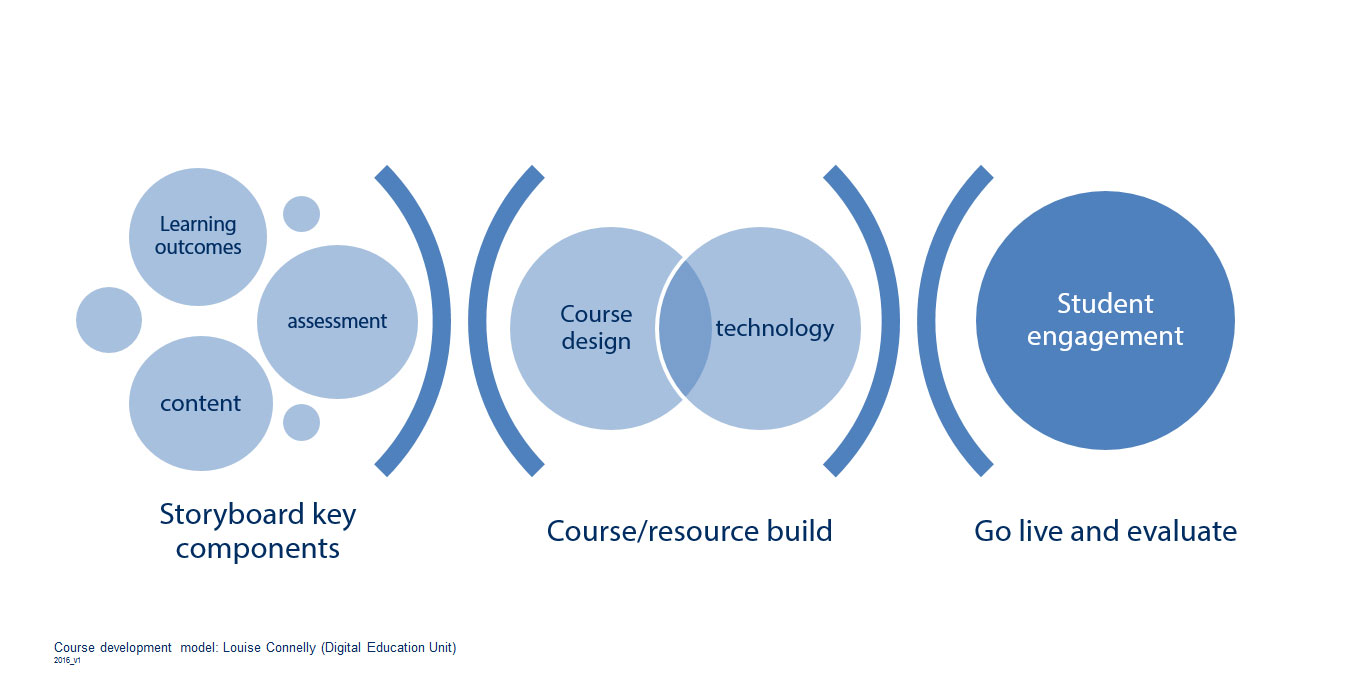 Designing effective and engaging assessments for online distance learning programmes can be rewarding and sometimes challenging. When undertaking this process we position the assessment design within the wider course design process (see diagram below). A key consideration of online distance learning (ODL) courses is to ensure that technology does not become a barrier to learning and that courses are ‘flexible but structured’.
Designing effective and engaging assessments for online distance learning programmes can be rewarding and sometimes challenging. When undertaking this process we position the assessment design within the wider course design process (see diagram below). A key consideration of online distance learning (ODL) courses is to ensure that technology does not become a barrier to learning and that courses are ‘flexible but structured’.

Different assessment approaches
At the Royal (Dick) School of Veterinary Studies (R(D)SVS), there are different types of assessment approaches which use various technologies. For example, on Blackboard Learn, there are multiple choice questions (MCQs), wikis (group and individual), and discussion boards. Other types of assessments include traditional essay/report, students submitting audio/video presentations, presenting via Blackboard Collaborate (virtual classroom), and the use of non-traditional platforms such as Padlet (a virtual corkboard). The variety of assessed/non-assessed, individual/group activities provide a rich learning environment for a diverse student cohort.
Plagiarism & academic best practice
At R(D)SVS, there are eight postgraduate online distance learning programmes. In relation to assessment, an area that is taken seriously is plagiarism and good academic practice. The School has developed a number of resources and mechanisms, in order to support students to develop their confidence in relation to academic skills and their understanding of plagiarism. Recently, there have been two developments.
- A plagiarism quiz was created and uploaded to all the ODL programme Base courses (programme level community courses for induction and programme etiquette). All students are signposted to the quiz during induction week. The quiz provides instant feedback to the students, as well as highlighting further resources, such as the ‘Improving Academic Practice with Turnitin’ PTAS-funded course that was piloted this year.
- By using the technology (adaptive release features on Blackboard Learn), the assessment submission links are not visible until the student has read the declaration of own work’ document and clicked the ‘mark reviewed’ button. This is to remind
students of the importance of good academic practice.
Suggestions for designing online assessments
Using the ‘storyboard’ model above, assessment design is often a collaborative approach between the academic and E-Learning Developer. This provides a creative discussion about online pedagogy and different assessments approaches which align with the learning outcomes. To assist, the following can be very useful for the discussion:
- A list of learning outcomes
- Programme overview: outline of assessments set on other programme courses. This will ensure there is variety and appropriate assessments for each course. This is particularly important when there may be a number of external lecturers or contributors to the programme
- Any technical limitationsg. some student cohorts have poor bandwidth which could result in technical challenges if video assessments are to be used
- Any innovative/creative assessment approachesg. mixed approach, such as students submitting a poster (designed in PowerPoint) alongside an audio (MP3) which describes the rationale for their poster design
- Get inspiration from other courses and colleagues.
The Future
We are constantly reviewing student feedback and exploring other approaches for assessment to ensure courses are pedagogically sound and continue to be engaging and rewarding for students.
Next steps:
Read the following useful articles recommended by the author –
- Dabbagh, N. (2007) The online learner: characteristics and pedagogical implications. Contemporary Issues inTechnology and Teacher Education, 7(3), 217-226
- Delahunty, J., Verenikina, I. and Jones, P. (2013) Socio-emotional connections: identity, belonging and learning in online interactions. A literature review. Technology, Pedagogy and Education.


 Louise Connelly
Louise Connelly